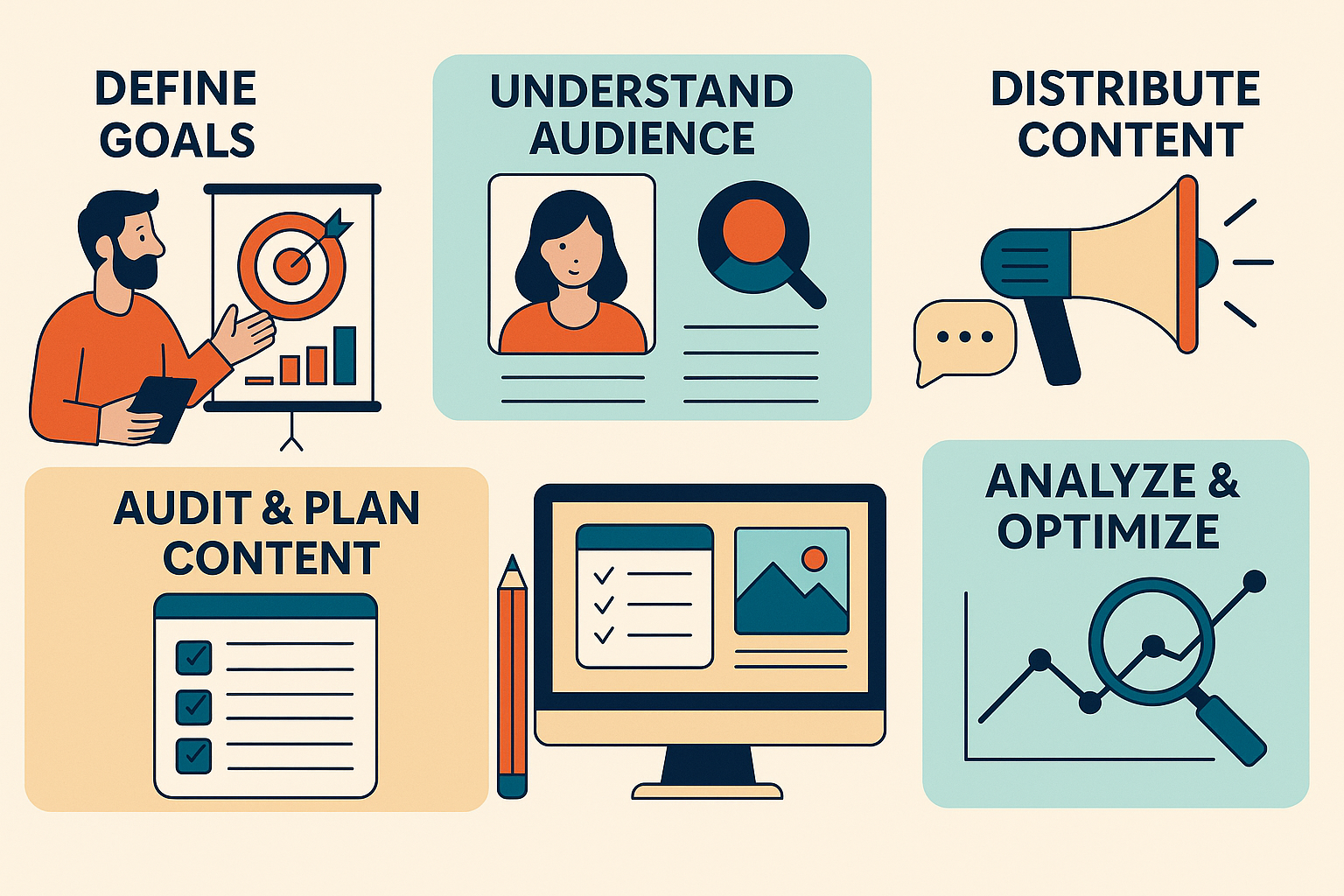
What Is a Content Marketing Strategy?
A content marketing strategy is not only exceedingly attractive in today’s age of accelerated progress in the digital arena — it’s a necessity.
A content marketing strategy is a grand plan about how you create, syndicate, and measure content to attract, engage, and convert your target audience.
From the Content Marketing Institute, over 80% of successful marketers admit to having their content strategy in writing, earning its worth in creating credibility for a brand and consistent traffic generation.
An understanding of this pillar is step one towards unraveling the actual potential of content marketing.
The Digital Age Mandate for a Content Marketing Plan
Your content will be disparate, random, and worthless without one.
A content marketing strategy puts your message on track and focused on your brand goals.
Key benefits are:
- Increased brand awareness through consistency of messaging.
- Increased audience engagement through relevant and helpful content.
- Increased conversions through offering the right content at each stage of the customer journey.
Example:
Businesses like HubSpot have been successful with content marketing by developing a strategic plan that produces 3x more leads than businesses without one.
Step-by-Step Guide to Creating a Winning Content Marketing Strategy
Building an effective content strategy requires structure, research, and execution. Let us delve into the most crucial steps:
a. Define Your Business & Content Goals
Begin by defining clearly-set goals for your content marketing.
Typical goals are:
- Driving organic traffic
- Generating leads
- Boosting sales and conversions
- Improving customer retention
Employ the SMART Goal formula (Specific, Measurable, Achievable, Relevant, Time-bound) to remain on course.
b. Know Your Target Audience
Excellent content starts with a deep understanding of your audience.
Create in-depth buyer personas through research:
- Demographics (age, occupation, interests)
- Pain points
- Goals and buying behaviors
Use Google Analytics, HubSpot’s Persona Generator, or customer surveys to guide your work.
c. Audit Your Current Content
Stock up on what you already have before creating new content.
A content audit will show:
- Performing content
- Content gaps in your library
- Old or struggling content that requires overhaul
Tools like Ahrefs, SEMrush, and Screaming Frog are ideal for auditing.

d. Design a Content Plan & Editorial Calendar
Having a pre-created content plan offers stability and direction.
Plan:
- Your master topics and sub-subtopics
- Types of content (blog posts, videos, infographics, podcasts)
- Posting schedule and preferred channels
Utilize tools like Trello, Notion, or Asana to design and organize your editorial calendar.
e. Publish and Share Your Content
Don’t hide good content in a rock — share it across platforms:
- SEO: Target keyword keyword optimization
- Social Media: Post on Instagram, LinkedIn, Facebook, TikTok
- Email Marketing: Nurturing leads through educational emails
- Paid Ads: Drive visibility through Google Ads or Facebook Ads
Tip: Repurpose one blog post as videos, carousels, tweets, etc. to get it to travel further.
f. Measure & Optimize Your Content Performance
Use analytics to know if your strategy is working.
Track:
- Organic traffic
- Engagement rates
- Bounce rates
- Conversions
Google Analytics, Hotjar, and Ahrefs are some of the tools that can assist you in tracking performance and optimizing accordingly.
Pro Tips to Succeed at Content Marketing in 2025
- Use AI for Smarter Content:
Use tools like ChatGPT, Jasper, and Surfer SEO to brainstorm and optimize. - Commit to Visual & Interactive Content:
Interactive infographics, Reels, and short videos engage more. - Prioritize User Experience (UX):
A mobile-friendly, fast-loading, well-structured website maximizes content visibility and conversion.

Avoid These Content Marketing Mistakes
Don’t do these:
- No direction: Content needs to be directed towards specific goals.
- Not hearing your audience: Always compose your message after knowing your audience.
- Untrustworthiness: Inconsistent posting harms credibility and SEO velocity.
Steering clear of these avoids putting your content strategy on the correct path.
Start Your Content Marketing Strategy Today
In the rapidly changing online age of today, your competitive advantage is a well-planned content marketing strategy.
With purpose, knowledge of your audience, ongoing content planning, and data-driven optimization, your company can discover lasting growth in engaging content.
📌 Content Marketing Strategy FAQs
Q: What is a content marketing strategy in online marketing
A: It’s a process document outlining how content is created, shared, and updated to achieve business goals.
Q: When will content marketing gain traction?
A: Usually, the effect is realized within 3–6 months, depending on consistency and quality.
Q: Should small businesses have a content plan?
A: Yes. Regardless of size, every business can gain from a focused content strategy.



